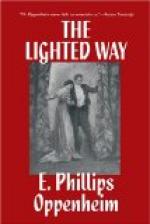“There is nothing more that I can do for you?” he asked.
“Nothing,” she replied. “Besides, I can hear Uncle Isaac coming.”
The door was suddenly opened. A thin, undersized man in worn black clothes, and with a somber hat of soft black felt still upon his head, came into the room. His dark hair was tinged with gray, he walked with a pronounced stoop. In his shabby clothes, fitting loosely upon his diminutive body, he should have been an insignificant figure, but somehow or other he was nothing of the sort. His thin lips curved into a discontented droop. His cheeks were hollow and his eyes shone with the brightness of the fanatic. Arnold greeted him familiarly.
“Hullo, Isaac!” he exclaimed. “You are just in time to save Ruth from being left all alone.”
The newcomer came to a standstill. He looked the speaker over from head to foot with an expression of growing disgust, and he spat upon the floor.
“What livery’s that?” he demanded.
Arnold laughed good-naturedly.
“Come, Isaac,” he protested, “I don’t often inflict it upon you, do I? It’s something that belongs to the world on the other side, you know. We all of us have to look over the fence now and then. I have to cross the borderland to-night for an hour or so.”
Isaac threw open the door by which he had entered.
“Get out of here,” he ordered. “If you were one of us, I’d call you a traitor for wearing the rags. As it is, I say that no one is welcomed under my roof who looks as you look now. Why, d—n it, I believe you’re a gentleman!”
Arnold laughed softly.
“My dear Isaac,” he retorted, “I am as I was born and made. You can’t blame me for that, can you? Besides,—”
He broke off suddenly. A little murmur from the girl behind reminded him of her presence. He passed on to the door.
“Good night, Isaac,” he said. “Look after Ruth. She’s lonely to-night.”
“I’ll look after her,” was the grim reply. “As for you, get you gone. There was one of your sort came to the meeting of Jameson’s moulders this afternoon. He had a question to ask and I answered him. He wanted to know wherein wealth was a sin, and I told him.”
Arnold Chetwode was young and his sense of humor triumphant. He turned on the threshold and looked into the shadowy room, dimly lit with its cheap lamp. He kissed his hands to Ruth.
“My dear Isaac,” he declared, lightly, “you are talking like an ass. I have two shillings and a penny ha’penny in my pocket, which has to last me till Saturday, and I earn my twenty-eight shillings a week in old Weatherley’s counting-house as honestly as you earn your wage by thundering from Labor platforms and articles in the Clarion. My clothes are part of the livery of civilization. The journalist who reports a Lord Mayor’s dinner has to wear them. Some day, when you’ve got your seat in Parliament, you’ll wear them yourself. Good night!”




